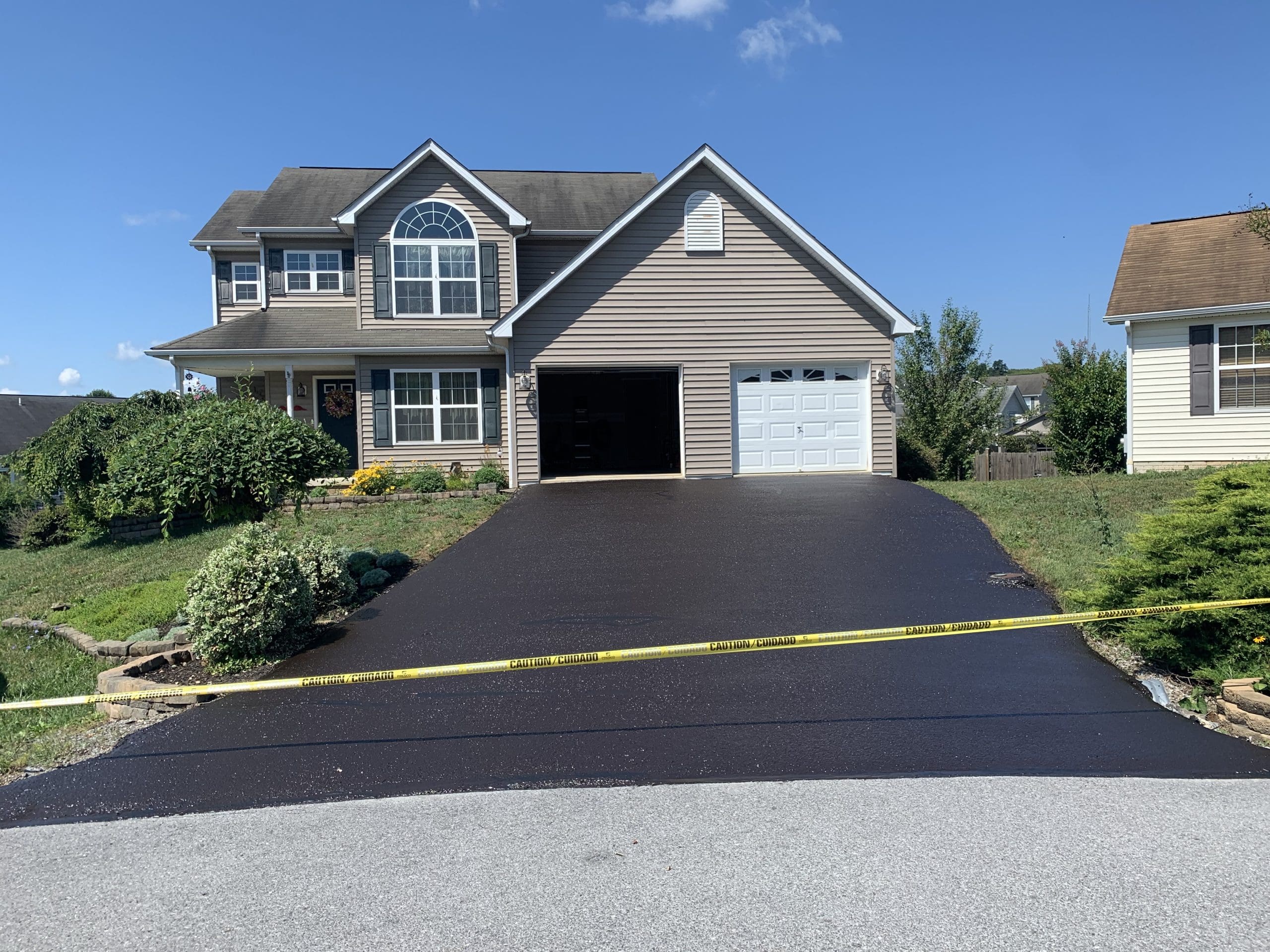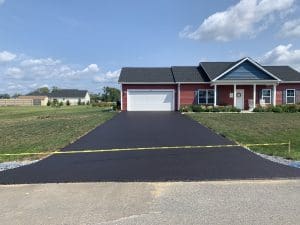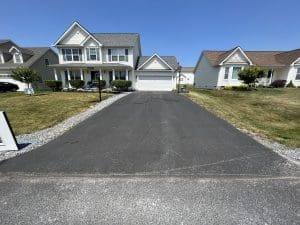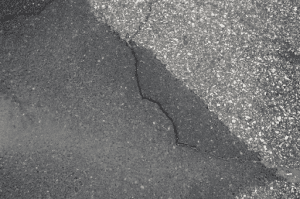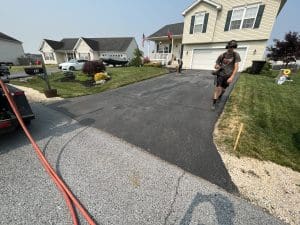Sealcoating vs Asphalt Replacement: Making an Informed Choice
When it comes to preserving and elevating the quality of your asphalt driveway or parking lot, Top Gun Sealcoating offers the expertise you need. While sealcoating and asphalt replacement are both viable options, understanding their distinctions will empower you to make the right decision for your property. In this article, we delve into the world of sealcoating, discussing the advantages and disadvantages and emphasizing key considerations. Additionally, we’ll explore how these choices align with environmental sustainability—a growing concern for property owners.
Sealcoating: Shielding Your Asphalt
Sealcoating serves as a preventive measure, creating a protective shield for your asphalt pavement. This essential process involves applying a specialized layer that acts as a formidable barrier against the elements—protecting your asphalt from the harsh effects of UV rays, moisture, and chemicals. Typically, sealcoating materials consist of coal tar or asphalt-based emulsions expertly sprayed or brushed onto the pavement.
What You Need to Know About Sealcoating
Sealcoating is a pivotal step in maintaining your asphalt. It extends the life of your pavement by guarding it against the relentless assault of UV rays that can cause fading and brittleness over time. Moreover, it thwarts water penetration, averting the formation of unsightly cracks and potholes. In essence, sealcoating creates a resilient barrier that keeps your asphalt in peak condition.
The Perks of Sealcoating
Sealcoating boasts a multitude of benefits. Firstly, it establishes a protective layer that effectively repels water infiltration, reducing the risk of cracks, potholes, and other deterioration. Furthermore, it’s a shield against the fading effects of UV rays, keeping your asphalt looking fresh and maintaining its structural integrity.
In addition to protection, sealcoating enhances the aesthetics of your pavement. Its glossy, jet-black finish and smooth surface significantly boost your property’s curb appeal. A well-maintained pavement not only looks inviting but also leaves a positive impression on guests and potential customers alike. Whether you’re dealing with a residential driveway or a commercial parking lot, sealcoating transforms the overall appearance of the area.
Most importantly, sealcoating offers long-term cost savings. By preventing deterioration, you sidestep costly repairs and replacements. Regular sealcoating can extend the lifespan of your asphalt pavement, translating into substantial financial benefits over time.
Considerations for Sealcoating
While the advantages of sealcoating are compelling, it’s crucial to acknowledge potential downsides. Sealcoating isn’t a permanent solution; the protective layer will eventually wear down and require reapplication. The frequency of this process depends on factors like traffic volume, climate conditions, and the quality of the sealcoating material used.
Weather conditions during application can also impact the effectiveness of sealcoating. It’s essential to choose the right time and weather conditions for optimal results. Consulting with a seasoned sealcoating contractor can provide valuable insights based on your specific location and climate.
Lastly, sealcoating is suitable for asphalt surfaces in good condition. Existing cracks or potholes should be addressed before sealcoating to ensure optimal results. Sealcoating doesn’t resolve structural issues within the pavement, so addressing any underlying problems is essential before applying the protective coating.
In Conclusion: Sealcoating for Long-lasting Excellence
In summary, sealcoating stands as an indispensable practice for preserving and extending the life of your asphalt pavement. It forms a formidable shield against the elements, thwarting the effects of UV rays, moisture, and chemicals while preventing unsightly cracks and potholes. Furthermore, sealcoating enhances the aesthetics of your pavement and reduces long-term maintenance expenses. However, it’s vital to consider the potential drawbacks and ensure proper application on a well-maintained surface. By comprehending the fundamentals of sealcoating and its advantages, you can confidently safeguard your asphalt pavement with Top Gun Sealcoating.
Embrace the Future with Asphalt Replacement
On the other hand, asphalt replacement involves a more extensive process. It necessitates the removal of the existing pavement and the installation of fresh asphalt. This option is typically chosen when the current pavement has sustained significant damage or has reached the end of its lifespan.
Unveiling Asphalt Replacement
Asphalt replacement is a comprehensive endeavor encompassing the excavation of existing pavement, base preparation, and the application of a brand-new asphalt layer. This intricate process demands professional expertise and specialized equipment to ensure a flawless installation.
The Upsides of Asphalt Replacement
One of the principal advantages of asphalt replacement is the creation of an entirely new pavement surface. This means that any existing cracks, potholes, or structural issues are completely addressed. Asphalt replacement also provides the opportunity to enhance the pavement’s design and layout, whether by widening lanes or adding additional parking spaces. Additionally, the durability of new asphalt surpasses that of sealcoating, standing strong against heavy traffic and adverse weather conditions.
The Possible Downsides of Asphalt Replacement
While asphalt replacement offers substantial benefits, it’s crucial to consider potential drawbacks. Firstly, it generally carries a higher price tag compared to sealcoating. The extensive process, encompassing labor and materials, represents a notable investment. Secondly, asphalt replacement typically requires more time to complete than sealcoating, which may temporarily disrupt your property or business operations. Lastly, it’s essential to contemplate the environmental impact, including traditional asphalt production and disposal.
Factors to Ponder When Choosing Between Sealcoating and Asphalt Replacement
In making the pivotal decision between sealcoating and asphalt replacement, several factors warrant careful consideration:
Assessing Your Asphalt’s Current Condition: The current state of your asphalt pavement plays a pivotal role. If your pavement exhibits significant damage, such as deep cracks, potholes, or structural concerns, asphalt replacement may be the appropriate choice. However, if your pavement is generally in good condition, sealcoating can offer the protection it requires.
Budgetary Constraints: Your budget serves as a guiding factor in your decision-making process. While sealcoating typically boasts a more budget-friendly price point, it’s essential to weigh long-term costs. Sealcoating necessitates periodic reapplication, while replacement offers a longer-lasting solution.
Longevity and Maintenance Requirements: Consider the lifespan and maintenance demands of each option. Sealcoating requires periodic reapplication, whereas asphalt replacement can endure for decades with proper maintenance. Assess how frequently you’re willing to invest time and resources into pavement upkeep.
The Environmental Impact of Sealcoating and Asphalt Replacement
In an era where environmental sustainability holds increasing importance, it’s imperative to evaluate how your choices affect the environment.
The Environmental Footprint of Sealcoating: Sealcoating can raise environmental concerns, particularly regarding the potential release of volatile organic compounds (VOCs) during the application process. To mitigate this, eco-friendly or low-VOC sealcoating products are available, offering a more environmentally conscious alternative.
Environmental Considerations with Asphalt Replacement: Asphalt replacement involves the removal and disposal of existing pavement, which can have ecological repercussions. However, initiatives such as asphalt recycling aim to minimize waste and promote sustainability.
In summary, both sealcoating and asphalt replacement present unique advantages and considerations. Your decision should be guided by the current condition of your asphalt, budgetary constraints, and your willingness to commit to long-term maintenance. Additionally, be conscientious of your impact on the environment, exploring eco-friendly options whenever possible. With a well-informed choice, you can ensure the longevity and performance of your asphalt pavement while minimizing your environmental footprint. Choose Top Gun Sealcoating to unlock the full potential of your asphalt, whether through expert sealcoating or comprehensive asphalt replacement services.
